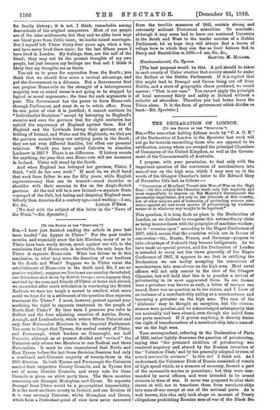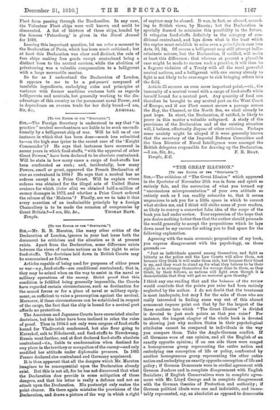THE DECLARATION OF LONDON. [To TEE EDITOR OF THE "Bracratoa.")
SIR,—The somewhat halting defence made by " C. A. G. B." of the Declaration of London in the Spectator last week will
not go far towards reconciling those who are opposed to its ratification, among whom are arrayed the principal Chambers of Commerce of the United Kingdom, as well as the Govern- ment of the Commonwealth of Australia.
I propose, with your permission, to deal only with the important question of the conversion of merchantmen into men-of-war on the high seas, which I may sum up in the words of the Glasgow Chamber's letter to Sir Edward Grey of November 14th last, as follows :—
"Conversion of Merchant Vessels into Men-of-War on the High Seas.—On this subject the Chamber needs only but urgently and most respectfully to impress on Ms Majesty's Government the paramount importance, not only in the interests of this country, but of other nations and of humanity, of protecting °versew com- merce against all and every species of privateering by whatever means or in whatever way sought to be legalised."
This question, it is true, finds no place in the Declaration of London, as we declined to recognise this extraordinary claim as being in accordance with the principles of maritime warfare ; but it " remains open" according to the Hague Conference of 1907, which means that the countries which are in favour of conversion—viz., Russia, France, and Germany—propose to take advantage of it should they become belligerents. As we have made no special protest, and the Declaration of London is intended to carry out the views generally of the Hague Conference of 1907, it appears to me that in ratifying the Declaration we are tacitly accepting the conversion of merchantmen into men-of-war on the high seas. Most naval officers will not only concur in the view of the Glasgow Chamber, but will hold that this is in practice a revival of privateering in its most aggravated form. In our former wars a privateer was known as such, a letter of marque was issued, there was no question as to her status, and I know of no instance of a merchant-ship sailing as a merchantman and becoming a privateer on the high seas. The case of the Alabama' may be thought an exception, but the circum- stances were peculiar, and we acknowledged subsequently that our neutrality had been abused, even though she sailed from our ports unarmed. If it proves anything, it directly denies the right of transformation of a merchant-ship into a man-of. war on the high seas.
Your correspondent, referring to the Declaration of Paris of 1856, rather lightly dismisses the question of privateering, saying that " the promised abolition of privateering was rendered nugatory and absurd by the Russian invention of the Volunteer Fleet,' and by the generally adopted system of armed mercantile cruisers." Is this so ? I think not. As I understand, the Volunteer Fleet of Russia consisted of vessels of high speed which, as a measure of economy, formed a part of the mercantile marine in peacetime ; but they were com- manded by naval officers, and were intended to be armed cruisers in time of war. It never was proposed to alter their status at will, nor to transform them from merchant-ships into men-of-war except at one of the national ports. As is well known, this idea only took shape on account of Treaty obligations prohibiting Russian men-of-war of the Black Sea Fleet from passing through the Dardanelles. In any case, the Volunteer Fleet ships were well known and could be discounted. A list of thirteen of these ships, headed by the famous 'Petersburg,' is given in the Naval Annual for 1910.
Leaving this important question, let me refer a moment to the Declaration of Paris, which has been much criticised ; but at least this Declaration was clear and distinct, the rule of free ships making free goods except contraband being a distinct boon to the neutral carriers, while the abolition of privateering was a valuable compensation to a belligerent with a large mercantile marine.
So far as I understand the Declaration of London, it appears to me to be a pot-pourri composed of insoluble ingredients, embodying rules and principles at variance with former maritime customs both as regards belligerents and neutrals, but generally working to the dis- advantage of this country as the paramount naval Power, and in dependence on oversee trade for her daily bread.—I am,







































 Previous page
Previous page